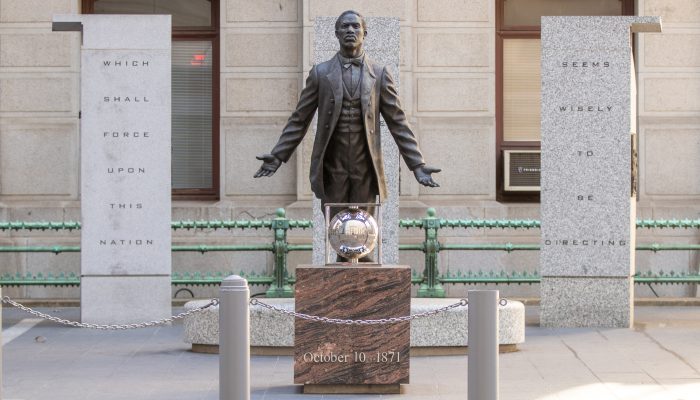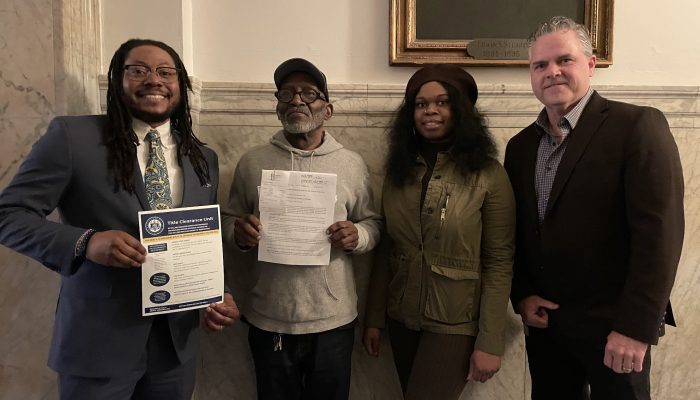Celebrated every February across the U.S., Black History Month commemorates Black Americans whose achievements have played essential roles in the founding and advancement of the country and advocacy for equality. Their contributions have come in all fields including business, government, science, politics, education, and the arts.
For Black History Month 2025, the Register of Wills office is sharing a series of short videos that highlight Black history-makers with ties to Philadelphia. Follow our Facebook, Instagram, and YouTube pages throughout February to learn about these influential role models.
Register of Wills John Sabatina, Esq., thanks you for celebrating Black History Month with us. Call us at (215) 686-6250 or visit phila.gov/wills to start a probate, request a probate record, file inheritance tax, get a marriage license, or request a marriage record.
Malcolm X, later known as Malik El-Shabazz, was a transformative leader, powerful orator, and champion of Black empowerment. Born in 1925 in Omaha, Nebraska, he overcame a troubled past to become a leading figure in the Nation of Islam, advocating for Black self-reliance and resistance against racial oppression. During his early life, Malcolm briefly resided in Philadelphia, where he continued to shape his understanding of racial and social dynamics. After leaving the Nation of Islam in 1964, Malcolm embraced Sunni Islam, promoting unity, human rights, and a global perspective on racial justice. His journey inspired millions before his assassination in 1965, leaving a lasting legacy of courage and conviction.
Wallace D. Muhammad, later known as Imam W. Deen Mohammed, was a visionary leader who redefined the spiritual path of millions. Born in 1933 as the son of Elijah Muhammad, he succeeded his father as the leader of the Nation of Islam in 1975. W.D. Muhammad briefly resided in Philadelphia, a city that has long been a center of Islamic culture in the United States. He led a historic transformation, guiding the organization toward mainstream Islam and emphasizing universal values of faith, education, and interfaith dialogue. His leadership fostered community development and spiritual growth, leaving an enduring impact on American Islam and beyond.
Sadie Tanner Mossell Alexander
Sadie Tanner Mossell Alexander was raised in Strawberry Mansion and achieved many firsts. While enrolled at the University of Pennsylvania in 1919, she became the first national president of Delta Sigma Theta sorority. In 1921, she became the first Black woman in the United States to earn a Ph.D. in economics and the second to earn a Ph.D. of any kind. She also was the first Black woman accepted into Penn Law School and the first admitted to the Pennsylvania Bar. Alexander served as the first Black woman assistant city solicitor in Philadelphia, and she was active in Civil Rights in Philadelphia and nationally throughout her lifetime.
Cecil B. Moore was an attorney, Philadelphia City Council member, and civil rights leader during the 1960s and ‘70s. Born in West Virginia, Moore served as a U.S. Marine during World War II and later settled in Philadelphia. He attended night school at Temple University to earn a law degree and quickly earned a reputation for representing poor, mostly African-American clients in North Philadelphia. He served as president of the Philadelphia chapter of the NAACP and as a member of City Council. In the mid-’60s, Moore led protests for the integration of schools and trade unions. He also led voter registration drives to mobilize black voters.
Most Philadelphians and sports fans need no introduction to John Chaney, the legendary men’s basketball coach for Temple University. Though he was born in Florida in 1932, Chaney lived most of his life in Philadelphia and truly embodied the local spirit. As a player, he was the Public League MVP with Benjamin Franklin High School, a college all-American, and a two-time MVP of the Eastern Basketball League. After coaching the Simon Gratz High School basketball team for six years, he led Cheyney University to a national championship and completed his Hall of Fame career by winning more than 500 games at Temple. Off the court, Chaney spoke out against NCAA rules that harmed Black student-athletes, and he was a powerful advocate for improving access to higher education for students of color and those from poor backgrounds.
Julian Abele made his mark as one of the nation’s leading architects of his time. Born in Philadelphia in 1881, Abele graduated from the school that would become Cheyney University, the oldest of all Historically Black Colleges and Universities in the United States. He later became the first Black student admitted into the architecture program at the University of Pennsylvania, where he succeeded despite discrimination. Throughout his illustrious career, Abele is credited with principal design of many public buildings, including the Philadelphia Museum of Art, Philadelphia’s Central Library, and much of the Duke University campus, where his portrait is displayed prominently in the main administration building.
Sister Rosetta Tharpe was a pioneering gospel singer, guitarist, and songwriter. Born in Arkansas in 1915, Tharpe settled in Philadelphia’s Yorktown section in the late 1950s at the height of her international fame. She is also known as “The Original Soul Sister” and “The Godmother of Rock ‘n’ Roll” for her influence on popular music icons including Chuck Berry, Little Richard, Aretha Franklin, Elvis, and Johnny Cash. Tharpe began performing as a child and gained widespread recognition in the 1930s and ’40s with recordings that controversially combined spiritual lyrics with her innovative electric guitar playing. Though rejected by many traditional churchgoers, these early crossover recordings and her live performances became hugely popular and introduced a new American art form to international audiences.
Derrick Pitts is the chief astronomer and leading media personality for the Franklin Institute, roles that have enabled him to impact the lives of countless schoolchildren and adult learners for over four decades. Raised in Tioga-Nicetown, Pitts was the second African-American student to enroll at Germantown Academy, graduating in 1973. Pitts joined the Franklin Institute in 1978 while studying for a degree in geology from St. Lawrence University. In addition to being the chief astronomer at the Institute, he is director of the Fels Planetarium. Pitts says he has dedicated his career to helping “translate complex science topics to levels that can be understood by people of all ages.” He has been a regular host and contributor for television, radio, and web-based programs locally and across the United States.
Octavius V. Catto is recognized as Philadelphia’s most prominent civil rights leader during the post-Civil War period. Born in South Carolina, his family moved to Philadelphia and settled near 8th and South streets. In 1854 at age 15, Catto enrolled in the first college for African-Americans in the United States, which later became Cheyney University. Catto would later teach at the school and join with other black leaders including Frederick Douglass in the fight against slavery. After the war, he fought for many other causes such as the desegregation of public transit and voting rights. Catto was shot and killed on Election Day 1871 while defending Black voting rights.


